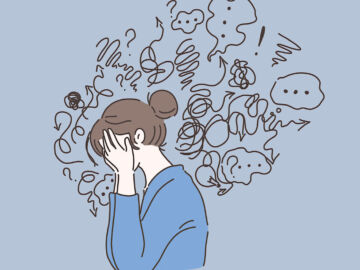Overview About Depression therapy
Chances are good that you’ve heard of depression before – but unless you have direct experience with it, it’s difficult to understand the full scope of what it means. Many years of misinformation, misconceptions, and poor representation in pop culture have muddied the definition of depression, and contrary to what many people think, it is not just sadness or laziness. Depressive disorders go much deeper than that, and manifest in many different ways – which means it’s crucial to recognize the signs and understand how to help friends and family who are depressed. We offer professional depression therapy in Calgary to those in need – be sure to read this page and contact us if it sounds like what you’ve been dealing with.
Signs of depression

Depressed people can show many different signs
While no two people will have the exact same set and scope of depression signs, there are some common symptoms and behaviours that should be noted:
- chronic depressed mood (especially for periods of days, weeks, or months)
- fatigue or lethargy
- difficulty concentrating
- lack of interest in activities, even enjoyable ones
- changes in weight or sleep patterns
- feelings of sadness, guilt, or low self-esteem
- feelings of hopelessness
- heightened sensitivity to rejection or other emotional situations
Everyone experiences these to some degree throughout daily life, but if they are becoming the norm rather than a periodic occurrence, you may be suffering from a form of depression.
types of depression
Depression types range from short, intense episodes to persistent, exhausting feelings that seem to never go away. There are a variety of causes – genetics, hormone imbalances, other medical conditions, even stress or poor nutrition – which makes it hard to set a strict definition of what depression is and how to treat it.
Some of the most common types are:
- Major Depressive Disorder (often called clinical depression)
- Persistent Depressive Disorder
- Bipolar disorder
- Postpartum depression
- Seasonal Affective Disorder
- Atypical depression (unique to each person)
Get the best depression treatment in Calgary now!

Options for depression therapy in calgary
The good news is, there are more resources than ever to help with depression, and there are many things you can do in your day-to-day life that can mitigate some effects as well. Practices like proper nutrition (the right minerals and vitamin balances help with brain and body health) and suitable exercise can alleviate some symptoms, and may be all you need to get back in your groove.
However, you may also need more help than that – and that’s okay, too. Depression is a common issue and should not be ignored. Our therapists have many tools to help clients overcome theirs, including acceptance and commitment therapy (ACT), cognitive-behavioural therapy (CBT), dialectical behaviour therapy (DBT), narrative therapy, supportive psychotherapy, and accelerated resolution therapy (ART). Within these methods are valuable tools that help with depression of any kind, and they can be used in conjunction with anti-depressants and other solutions to create a custom path forward for you.
Remember, whether it is a family member or a stranger, a schoolmate or a friend, when it comes to depression – you are not alone in recognizing it, dealing with it, or trying to help with it. If you need immediate assistance for depression in Calgary, there are resources such as the Alberta Health Services Mental Health helpline at 1-877-303-2642. For long-term strategies in dealing with depressive disorders, guided by a passionate team of experts, the counsellors of Your Counselling are here to help.
Meet Our Experts
Why Work with Us
1-on-1 Counselling
Take the first step towards transforming your life today!
Couples Counselling
Nurture your connection, resolve challenges, and strengthen your relationship!
Online Counselling
Providing confidential and accessible online counselling!
Our Areas of Counselling & Therapy Expertise
If you find yourself experiencing emotional pain, sleepless nights, depression, and worry, or feel your goals are slipping away from you – our counselling services in Calgary can help you.
Frequently Asked Questions
Q: Can children experience depression?
Yes. Childhood depression is more common than you might think, too. A 2020 study of parents found that 1 out of every 25 Canadian children between ages 5-11 – that is, about one child for every elementary classroom around the country – had some mental health struggles. The study also showed that many parents are not aware of the feelings or depressive episodes their children face, long before the independence of their teenage years. See more on this dedicated blog post.
Q: who is affected by postpartum depression?
PPD can affect anyone who has recently given birth, regardless of age, race, or economic status. In fact, it’s estimated that about 10-20% of new mothers experience some form of PPD, though up to half of those are never diagnosed. It’s important to remember that PPD is not a sign of weakness or failure as a mother. Rather, it’s a medical condition that requires depression treatment in Calgary for the improved health of parents and the baby. Even men can experience PPD. Learn more by clicking over to our blog about PPD.
Q: are depression and anxiety related?
In 2017, a thorough study of worldwide health discovered that approximately 264 million people – about one in every group of twenty – suffer from a form of depression. The number for anxiety is even higher, at about 284 million. This tells us that these two conditions are not the same, even though they often occur together and share many of the same symptoms. We go further into depth on their relationship in this blog post.
Q: will depression ever go away?
This is a question with as many answers as there are people in the world. Depression treatment and a higher quality of life are very dependent on individual circumstances. However, we can confidently say that with the many therapies and breakthroughs in the field over the last few decades, depression has never been more manageable. Learn everything you need to know about depression here.
IT’s time to take control of your depression
Related Blogs & Articles

What Is the Cost of Therapy in Calgary?
If you had to guess out of the blue, how much do you think a 50-minute therapy session is in…

How To Manage Anxiety and Stress
Life doesn’t come with a recipe to follow, a tour guide or a manual. It can be messy, unpredictable and downright challenging. Stress unfortunately is just part of the deal.

Symptoms, Treatments, and Causes of Postpartum Depression
Bringing a child into the world can be one of life’s most beautiful – and most challenging – experiences, happening…















